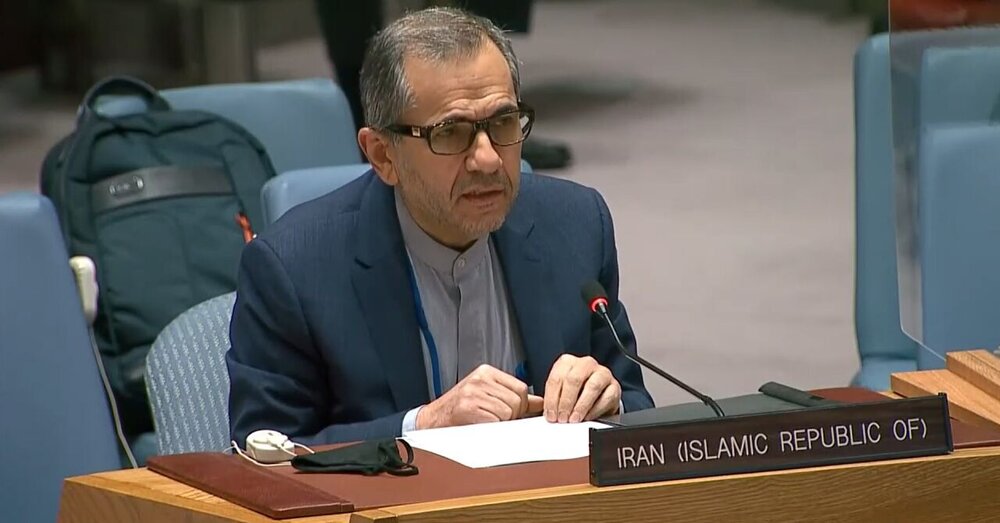Iranian diplomat expresses uncertainty on U.S. intensity on nuclear disarmament

TEHRAN - The ambassador of Iran to the United Nations has expressed skepticism about the political will of the U.S. to uphold its pledges to nuclear disarmament, saying Washington has been turning a blind eye to the Israeli regime's nuclear arsenals.
Delivering a speech at the Tenth NPT Review Conference on Tuesday, Majid Takht Ravanchi expressed Iran's deep concern over lack of progress in making nuclear weapons states to abide by their commitments to abandon their nuclear arms and disarm.
Here is his statement:
“My delegation has contributed constructively to the discussions and draft reports. However, regrettably due to some imbalanced contents of draft reports, none of them garnered consensus. We share the deep concern of the NNWS (non-nuclear weapons states) regarding the lack of progress in the implementation of nuclear disarmament obligations and commitments. Three weeks of intense negotiations reveal that the NWS (nuclear weapons states) do not have the determination and political will to accept any concrete commitments or timetable, benchmarks or targets that are required for making progress in our negotiations on nuclear disarmament pillar.
My delegation underlines that the positions of the nuclear weapon States echoed and supported by the so-called umbrella states, including their attempt to replace nuclear disarmament with nuclear risk reduction are contrary to their explicit legal obligations concerning nuclear disarmament.
I would like to add that establishing a West Asian zone free of weapons of mass destruction is long overdue after the consensual adoption of the resolution 1995. To implement this resolution, the 2010 Review Conference adopted by consensus a detailed plan of action and agreed that the Secretary-General and the co-sponsors of the 1995 resolution, in consultation with the States of the region, convene and exert their utmost efforts to ensure the success of a conference in 2012 that was to be attended by all States of the West Asia, on the establishment of a West Asian zone free of nuclear weapons and all other weapons of mass destruction. However, after delays in convening the Conference, at the first, second and third sessions of the Preparatory Committee, in 2012, 2013, and 2014, the NAM and regional countries warned that any further delay in convening the 2012 conference would seriously jeopardize the overall implementation of the conclusions and recommendations for follow-on actions and would represent a major setback in that regard.
We are firmly convinced that the Conference was postponed indefinitely because of the U.S.’ opposition and this has been the persistent policy of the U.S. to turn a blind eye to the nuclear arsenals of the Israeli regime while not supporting the convening of the Conference.
Now, we expect the current Conference to reject the impediments to convening the conference. The failure to convene the conference in 2012 contradicts and violates the collective agreement of the States parties contained in the conclusions and recommendations for follow-on actions adopted by the 2010 Review Conference and contravenes the letter and spirit of the 1995 resolution on the West Asia.
Despite the lack of required inclusivity and transparency in developing the SB II draft report, once again we reiterate our main proposals in this regard, and would like to emphasize that any document without embracing the ideas contained in our proposals, any glimpse of consensus will be faded away. In accordance with our proposals which are fully consistent with the NAM positions, the Conference, inter alai, Expresses concern about the lack of progress towards the implementation of the 1995 resolution and the 2010 action plan on the West Asia; and calls upon Israel to renounce possession of nuclear weapons and eliminate its entire stockpile of nuclear weapons.
It reaffirms that the accession of Israel to the Non-Proliferation Treaty without precondition and further delay and the placement of all of its nuclear activities and facilities under the comprehensive IAEA safeguards is essential in realizing the goal of universal adherence to the Treaty in the West Asia and the establishment of a nuclear-weapon-free zone in the West Asia.
It expresses its strong support for the other process launched by the Conference on the Establishment of a West Asia Zone Free of Nuclear Weapons and Other Weapons of Mass Destruction convened by the Secretary-General, pursuant to General Assembly decision 73/546, to elaborate a legally binding treaty on the establishment of the zone on the basis of consensus.”
